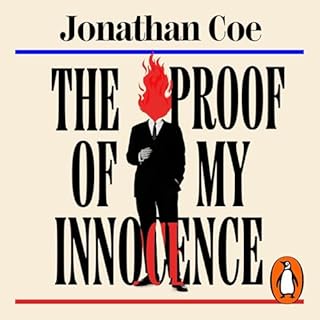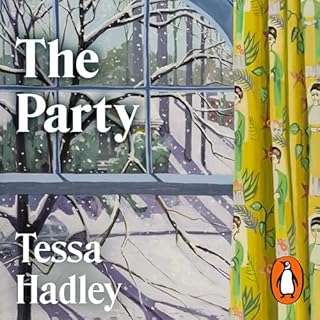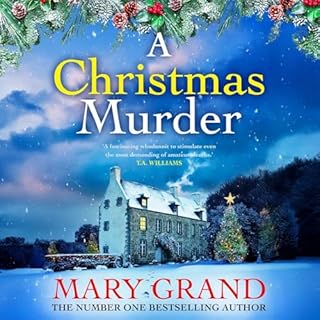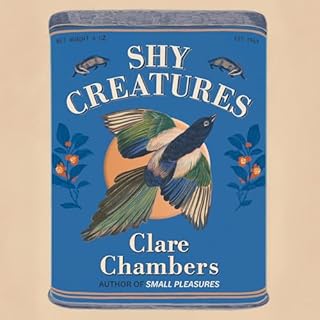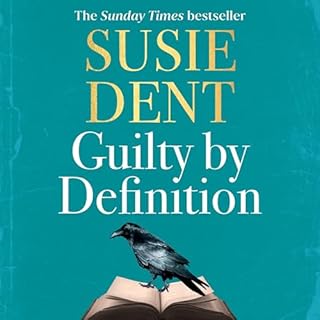Rachel Redford
- 359
- reviews
- 2,200
- helpful votes
- 362
- ratings
-
The Echoes
- By: Evie Wyld
- Narrated by: Vivien Carter, Sebastian Humphreys
- Length: 7 hrs and 33 mins
- Unabridged
-
Overall4 out of 5 stars 17
-
Performance4 out of 5 stars 15
-
Story4 out of 5 stars 15
Max didn’t believe in an afterlife. Until he died. Now, as a reluctant ghost trying to work out why he remains, he watches his girlfriend Hannah lost in grief in the flat they shared and begins to realise how much of her life was invisible to him. In the weeks and months before Max’s death, Hannah is haunted by the secrets she left Australia to escape. A relationship with Max seems to offer the potential of a different story, but the past refuses to stay hidden. It finds expression in the untold stories of the people she grew up with.
-
5 out of 5 stars
-
I loved it!
- By Rachel Redford on 28-12-24
- The Echoes
- By: Evie Wyld
- Narrated by: Vivien Carter, Sebastian Humphreys
I loved it!
Reviewed: 28-12-24
I’d never heard of the award-winning Australian writer Evie Wyld before noting a Guardian recommendation. I’ll definitely be back for more – I loved it! It’s SO unusual: tragi-funny, shocking, witty-sharp, heart-breaking, powerfully positive, honest but non-judgemental, resonating, intensely alive and linguistically and stylistically adventurous!
Hannah and Max have been together for six years living in London where Max is a creative writing teacher and Hannah has left behind a troubled past in Australia which she keeps well under wraps. They have reached that stage: should they get married? Should they have children? That the book begins with Hannah recovering from a termination which she has had without telling Max sets off this dislocated and fragmented novel. Through twists and turns the narratives of Hannah and Max alternate, delving more and more deeply into each of them. Vivien Carter and Sebastian Humphreys, the two narrators, add to the listening enjoyment, both of them absolutely in tune with their characters.
The Echoes of the tile is the area of Australia where Hannah endured her childhood, but more importantly they are the inescapable repercussions of those years of her unfeasibly dysfunctional family. Uncle Tone’s treatment of her sister Rachel on the struggling family’s goat farm is just one of many strands of the resounding echoes , unresolved in Hannah’s life in London. (Incidentally, if your Christmas dinner guests didn’t gel as well as you had hoped, wait till you witness the culture clash in Max and Hannah’s London flat. We’ve all been there!)
The novels’ structure across continents and decades is assured and satisfying, and includes an idea which just shouldn’t work. Max dies partway through and his narration becomes spectral, allowing him to analyse the relationship between him and Hannah from his point of view, and to observe her life without him from above. I’m not a supernatural fan, but against all odds. this works brilliantly!
Something went wrong. Please try again in a few minutes.
You voted on this review!
You reported this review!
1 person found this helpful
-
The Proof of My Innocence
- By: Jonathan Coe
- Narrated by: Sam Woolf, Alana Maria, Charlotte Worthing, and others
- Length: 12 hrs and 14 mins
- Unabridged
-
Overall4 out of 5 stars 127
-
Performance4.5 out of 5 stars 119
-
Story4 out of 5 stars 119
Post-university life doesn’t suit Phyl. Time passes slowly living back home with her parents, working a zero-hour contract serving Japanese food to holidaymakers at Heathrow’s Terminal 5. As for her budding plans of becoming a writer, those are going nowhere. That is, until family friend Chris comes to stay. He’s been on the path to uncover a sinister think-tank, founded at Cambridge University in the 1980s, that’s been scheming to push the British government in a more extreme direction. One that’s finally poised to put their plans into action.
-
3 out of 5 stars
-
Over complicated plot with the odd interesting scene
- By L. Pemberton on 31-01-25
- The Proof of My Innocence
- By: Jonathan Coe
- Narrated by: Sam Woolf, Alana Maria, Charlotte Worthing, Mark Stobbart, Roy McMillan
What a blast!
Reviewed: 14-12-24
I think Jonathan Coe had an absolute blast writing this, his fifteenth novel. He must have had to draw up extremely complex spread sheets of what all his characters were doing in the present and in the past. What a tangled web indeed, sometimes bewildering to the listener!
Coe swipes at everything and everyone from Liz Truss’s lamentable brief premiership, queues for sighting the Queen’s coffin, the vileness of those with power and privilege, worthless mystery novels and the dire state of book publication then and now, the pursuit of money and the abandonment of principles in the hierarchy, decades-old dark and dirty duplicity in a Cambridge College resurfacing in the present day, the deplorable state of employment with rubbish jobs, and zero hours, the deadly hold of wokery... The list goes on and on. It’s a raucous, passionate, outrageous, witty melange of everything that’s wrong about our present society made wickedly witty and enjoyable.
I liked young Phyl fresh from university with a useless degree living at home and working in a sushi bar. So far so credible, but her final career and choice of partner is gloriously and wickedly woke!
There is a great deal that is sharp and clever throughout, but I particularly liked the theme of the ballad of Lord Randall which one character would mumble in his sleep. I can’t say more without spoiling what I thought was the cleverest (if ridiculous) strand in this massive plait of invention.
Something went wrong. Please try again in a few minutes.
You voted on this review!
You reported this review!
-
Barrowbeck
- By: Andrew Michael Hurley
- Narrated by: Gabriella Pond, Matt Jamie
- Length: 7 hrs and 20 mins
- Unabridged
-
Overall4.5 out of 5 stars 37
-
Performance4.5 out of 5 stars 34
-
Story4.5 out of 5 stars 34
In a remote and seemingly cursed village on the Yorkshire Lancashire border, the inhabitants of Barrowbeck wrestle with life, death and a landscape that is wild and mercurial. Friends gather to support a widower whose wife has died in mysterious circumstances; an elderly teacher is unnerved by one of his pupils; a childless couple must make an agonising decision; sisters welcome a lodger into their home. Set over the course of a year, these gothic stories are riven with psychological trauma, unsettling events and encroaching darkness.
-
3 out of 5 stars
-
If you go down to Barrowbeck today....
- By Heinz57 on 12-12-24
- Barrowbeck
- By: Andrew Michael Hurley
- Narrated by: Gabriella Pond, Matt Jamie
You need to listen to it twice!
Reviewed: 12-12-24
I e enjoyed (and reviewed on my Listener Page) Starveacre and The Loney, Hurley’s previous successful novels, but at first I was thrown by Barrowbeck. The first chapter traced the displacement of a small farming community by Anglo-Saxon invaders. The second was set in in Sicily where a strange traveller intrudes into another small community. I was confused . Are these not chapters, but (very) short stories? After I’d listened to a few more, my confusion wasn’t helped by the very sudden dangling endings to each one. The printed book no doubt explains on the back cover that these are inter-linked stories following fictional Barrowbeck on the Yorkshire-Lancashire border through the centuries. The audio information did not explain this. Having got about half way through, I went back to the beginning and started again. It was worth it.
Barrowbeck itself, originally established by those half-starved people who had fled from the Anglo-Saaxon invasion is the community mutating through the centuries and into the not far distant future when the country is partially annihilated by climate change induced floods.
The vividly observed lives in these linked stories are modified and changed incrementally. Folk lore, hauntings, goblins, witchcraft, and ancient belief systems co-exist uneasily with encroaching ‘advances’ in science, technology and thought.
Landscape, trees, hollows, becks, skies, plants, weather, crops… these make up the enduring fabric of Barrowbeck, whilst the stories themselves are uncomfortable and disturbing, some with a dash of menace. The kind-hearted vicar who opens his garden to poor children for a party with cake and lemonade once a year is nurturing his young son to follow him into the brotherhood. But the boy has other ideas when a child crippled with rickets is put into his care. We’re left dangling at the very end, but aware of what Hurley never actually describes.
Weird and haunting, these well-read A stories with-hold all the answers. What exactly is the terrible price which the childless parents of weirdly acquired babies later have to pay? And what on earth is going on with that two eldritch women running a grotesque b&b? The outstanding stories for me were the two on the effects of the world wars with its mystical music beautifully entwined. Deeply moving.
Something went wrong. Please try again in a few minutes.
You voted on this review!
You reported this review!
-
The Party
- By: Tessa Hadley
- Narrated by: Tessa Hadley
- Length: 2 hrs and 54 mins
- Unabridged
-
Overall3 out of 5 stars 12
-
Performance3.5 out of 5 stars 12
-
Story3 out of 5 stars 12
On a winter Saturday night in post-war Bristol, sisters Moira and Evelyn, on the cusp of adulthood, go to an art students’ party in a dockside pub; there they meet two men, Paul and Sinden, whose air of worldliness and sophistication both intrigues and repels them. Sinden calls a few days later to invite them over to the grand suburban mansion Paul shares with his brother and sister, and Moira accepts despite Evelyn’s misgivings. As the night unfolds in this unfamiliar, glamorous new setting, the sisters learn things about themselves and each other that shock them.
-
4 out of 5 stars
-
Accessibility
- By Amazon Customer on 03-12-24
- The Party
- By: Tessa Hadley
- Narrated by: Tessa Hadley
Rather disappointing
Reviewed: 15-11-24
I have much enjoyed several of Tessa Hadley’s previous titles, but I found this one, filmic, vivid and well read as it is, rather disappointing.
Set in Bristol in the late 1940s after WW2, Moira and her younger student sister Evelyn meet some unlikeable men at an unenjoyable party. One of them, the older, once-married Siinden, manages to entice them to another party in the well-off Sneyd Park area of the city where Evelyn is enticed upstairs with him and the obvious happens.
As so often with authors recreating the Forties or Fifties, Hadley overdoes the contemporary details, particularly of food and dress. Not all aspects are convincing for the late Forties, however. The sisters’ home is stifling, but it seems unlikely that in the late Forties an over-protective father would be living with his wife and daughters whilst pursuing an open affair with another woman.
It is after all, a novella, I know, but I found it too slight. Having finished it, I felt as though Hadley had given me a slice of good fruit cake, but the rest of the cake wasn’t on offer.
Something went wrong. Please try again in a few minutes.
You voted on this review!
You reported this review!
-
The Scapegoat
- The Brilliant Brief Life of the Duke of Buckingham
- By: Lucy Hughes-Hallett
- Narrated by: Lucy Hughes-Hallett
- Length: 25 hrs and 42 mins
- Unabridged
-
Overall5 out of 5 stars 19
-
Performance5 out of 5 stars 17
-
Story5 out of 5 stars 17
With a novelist’s touch, Lucy Hughes-Hallett transports us into a courtly world of masques and dancing, exquisite clothes, the art of Rubens and Van Dyck, gender-fluidity, sex and appallingly rudimentary medicine. These were dangerous and complicated times, an era where witch hunts coexisted with Descartian rationality, and Buckingham stood at its centre until his spectacular fall from grace.
-
5 out of 5 stars
-
an excellent cultural history!
- By Rachel Redford on 14-11-24
- The Scapegoat
- The Brilliant Brief Life of the Duke of Buckingham
- By: Lucy Hughes-Hallett
- Narrated by: Lucy Hughes-Hallett
an excellent cultural history!
Reviewed: 14-11-24
Lucy Hughes-Hallett reads her own work beautifully which is particularly important when an audio book runs for more than 24 hours! Her voice is mellifluous and the narration well paced.
And what a jam-packed account of the career of George Villiers this is!Twenty-six years younger than King James 1st, Villiers was created Duke of Buckingham and High Admiral thus becoming one of the most powerful men in England, and, in his own words, the King’s darling and devoted ‘dog’. After the death of King James, Buckingham continued as the favourite of Charles 1st , both relationships being fully documented here in the generous quotations from intimate and passionate letters.
The history of Buckingham’s political career is full and clearly explained, but what I enjoyed most about Scapegoat is what sets it apart from other conventional histories , and that is the author’s inclusion of so much cultural detail.
The many paintings amassed by Buckingham, James and Charles are an example. The descriptions are vivid and the significance of each is interpreted. Interesting too are the accounts of the purchase of the art works and of their labour-intensive transportation back to England.
Existing histories no doubt record Buckingham’s extravagant dress and demeanour, but Hughes-Hallett immerses the reader in a colourful kaleidoscope of all the fabulous silks, fabrics and embroideries , densely studded with sparkling jewels and decked with strings of pearls , with which he was swathed, telling us also where and how these accoutrements were sourced and assembled.
The suffering of the men I who crewed the ships and of the troops involved in Buckingham’s over-ambitious and ill-fated expeditions is no doubt well-known, but the author’s details of the rancid food served up from the previous expedition which poisoned many of the men, along with his cruel rejection of their pleas for help, are particularly powerful.
I also enjoyed the inclusion of contemporary written works illustrating the unpopularity of Buckingham in his later career. Ben Jonson’s play Sejanus was performed with the classically educated audience’s full awareness of the parallel between Buckingham and the fall of Sejanus, the favourite of Emperor Tiberius. The author’s digression on John Donne’s delivery of his sermons illustrates her explanation of the crucial importance of parliamentary oratory .
But did Lucy Hughes-Hallett really choose this inappropriate title for her book? Surely not! Or was she perhaps unsuccessfully intending to echo John Aubrey’s Brief Lives? Buckingham was 36 when he was assassinated – a brief life in today’s terms, but not remarkably so in 1628. Secondly, Buckingham’s early career could be described as brilliant, but not his life. Most importantly, despite the author’s unconvincing argument in one of the final chapters, Scapegoat is not appropriate term for a a man whose personal reckless ambition was responsible for the deaths of thousands upon thousands of the starving and diseased of men.
So, full marks overall, but nul points for the title!
Something went wrong. Please try again in a few minutes.
You voted on this review!
You reported this review!
1 person found this helpful
-
Tasting Sunlight
- By: Ewald Arenz
- Narrated by: Julia Barrie
- Length: 7 hrs and 49 mins
- Unabridged
-
Overall4.5 out of 5 stars 14
-
Performance4.5 out of 5 stars 12
-
Story4.5 out of 5 stars 12
Teenager Sally has just run away from a clinic where she to be treated for anorexia. She's furious with everything and everyone, and wants to be left in peace. Liss is in her 40s, living alone on a large farm that she runs single-handedly. She has little contact with the outside world, and no need for other people. From their first meeting, Sally realises that Liss isn't like other adults: she expects nothing of Sally and simply accepts who she is, offering her a bed for the night with no questions asked.
-
5 out of 5 stars
-
A beautiful picture
- By fiona c cross on 26-11-22
- Tasting Sunlight
- By: Ewald Arenz
- Narrated by: Julia Barrie
Not to be missed!
Reviewed: 06-10-24
If I hadn’t been lying awake at 3am recently, I would not have tuned into the World Service and heard Ewald Arenz’s spell-binding novel Tasting Sunlight being discussed with readers phoning in from all over the world with their questions for an author I had never heard of. I would have missed one of the best experiences of my extremely long life of listening to audiobooks!
Ewald Arenz has published around twenty novels to acclaim in Germany, but he was in his mid- fifties before Alte Sorten (the book’s German title) was published in hardback in 2019 followed by the stratospheric success of the paperback. It is only with the translation into English by Rachel Ward that Tasting Sunlight has hit readers in the English speaking market the majority of whom. like me, know nothing of current novels written in German.
The scenario of Tasting Sunlight is simple. Seventeen year-old Sally has run away from the clinic, one of a succession of such places which her doting - but to Sally controlling - parents have sent her in a vain attempt to cure her of anorexia and self-harming. On her flight, full of rebellious anger, mental pain and confusion, she stumbles into long established family farmland now worked single-handedly by reclusive middle-aged Liss . This is no bucolic idyll, but Franconia where Ewald Arenz grew up, and where the soil is unforgiving and farming is hard. We learn only gradually how Liss’s own tempestuous past keys into her understanding of this young damaged adolescent.
Liss gives Sally refuge and together, at first with few words spoken, the troubled runaway begins to help Liss with daily tasks, absorbing as she does so the healing presence of the earth and sky. Transcendent in all its various forms, nature is beautifully painted. We are inside Sally’s head filled with her frustrations and rage, which the author is able to create with such astonishing reality from his long experience as a gymnasium (sixth form college) teacher. Surely but subtly the relationship between the Liss and Sally develops as the labour on the farm merged with the natural world transforms and heals. After Sally has been in her sanctuary for three weeks, the narrative develops dramatically in ways I don’t want to spoil.
The German title Alte Sorten refers to the ‘old varieties’ of pears grown on the farm, the blissfully sweet fruit which when Sally first bites into one she thinks it tastes of sunlight, giving the book its English title. This pear-tasting scene and the section describing the gathering of grapes in the vineyard are especially iridescent. The German title also suggests one of the book’s subtly communicated but most powerful themes: the positive role of tradition and the experience of age needed for the raising of fulfilled and mentally healthy young people.
The wrong choice of narrator could have damaged Tasting Sunlight which is quite unlike current novels by authors living in Britain. Julie Barrie comes from Yorkshire and has a Geordie mother but she has created a young voice with a suggestion of a non-English accent, enough to remind us that we are in another country but , as the phone-ins on the World Service showed, the themes are universal in their appeal.
Tasting Sunlight is not the only novel by Ewald Arentz available on Audible. Originally published in 2021 One Grand Summer (der Grosse Sommer)is the second of the author’s novels to be translated by Rachel Ward and, I am delighted to see, has been on Audible since July 2024.
Something went wrong. Please try again in a few minutes.
You voted on this review!
You reported this review!
-
A Christmas Murder
- By: Mary Grand
- Narrated by: Karen Cass
- Length: 9 hrs and 24 mins
- Unabridged
-
Overall4.5 out of 5 stars 10
-
Performance4 out of 5 stars 9
-
Story4.5 out of 5 stars 9
Susan didn’t plan on being an amateur sleuth and, after two successful investigations, she’s looking forward to a quiet Christmas. So, when local businesswoman Meera is in desperate need of help, Susan agrees rather reluctantly. The task should be easy enough. The infamous press mogul Duncan Fern is coming back to the Isle of Wight, the scene of his family’s childhood holidays, to celebrate Christmas with his grown-up children and their partners, his new glamorous wife Kirsten who is forever dripping with diamonds, and the spikey editor of his paper the Morning Flame, Antoine.
-
5 out of 5 stars
-
The characters and ending
- By lizzie on 01-01-25
- A Christmas Murder
- By: Mary Grand
- Narrated by: Karen Cass
A murderous family Christmas!
Reviewed: 30-09-24
If you’re a newspaper mogul with a diamond-draped new wife, the expensively renovated Bishopstone Manor on the Isle of Wight would seem just the place for your extended family Christmas. Enveloped in bracing sea air and offering a dizzying array of fine food and wine what could possibly go wrong there?
With Susan he local amateur sleuth helping out her friend who is organising the celebrations, and a family obviously riven by quarrels and nastiness, we know a lot will go wrong. No time is lost. Next morning Duncan , the deeply unpleasant mogul already on medication, is dead and the police are satisfied he has died from natural causes.
Of course Susan won’t accept that and of course she’s right, but it’s the intricacies of strained relationships between these Christmas revellers which keep us guessing. Who would trust slippery Antoine, the editor of Duncan’s newspaper? What is the terrible secret surrounding the death of Duncan’s first wife and mother of his impossibly fey and damaged daughter and his apparently duplicitous son? Who is trying to silence Susan as her investigations inch further towards finding the truth. (Isle of Wight readers might not want to take part in the Boxing Day swim after this!)….
As in Mary Grand’s previous murder mysteries in this series, the island setting gives the story a magical edge. The ferries have ground to a halt in the bad weather and whilst the party is trapped, Susan’s dogs celebrate their freedom on the beach and downs.
Karen Cass is a good narrator, injecting just the right amount of energy and suspense into her voice.
Something went wrong. Please try again in a few minutes.
You voted on this review!
You reported this review!
-
Our London Lives
- By: Christine Dwyer Hickey
- Narrated by: Owen Roe, Michèle Forbes
- Length: 15 hrs and 7 mins
- Unabridged
-
Overall4.5 out of 5 stars 29
-
Performance4.5 out of 5 stars 26
-
Story4.5 out of 5 stars 26
1979. In the vast and often unforgiving city of London, two Irish outsiders seeking refuge find one another: Milly, a teenage runaway, and Pip, a young boxer full of anger and potential who is beginning to drink it all away. Over the decades their lives follow different paths, interweaving from time to time, often in one another's sight, always on one another's mind, yet rarely together.
-
5 out of 5 stars
-
Wonderful!
- By Rachel Redford on 25-09-24
- Our London Lives
- By: Christine Dwyer Hickey
- Narrated by: Owen Roe, Michèle Forbes
Wonderful!
Reviewed: 25-09-24
This is a wonderful 40 year span of two lives. Created in alternating narratives of astonishing reality, musicality and tenderness , are the two struggling human beings Milly and Philip. Milly had come from Ireland as an eighteen year-old and found work in Mrs Oak’s pub in London . Within her first year she has given birth to, and had taken away from her, baby Flora who remains viscerally within her throughout the decades. She has also fallen in love with Philip, the hard-drinking local whose long and troubled life as a recovering alcoholic over the years meshes in and out with Milly’s own
The Irish writer Christine Dwyer Hickey is the author of a host of award winning novels but her latest Our London Life is the first I have listened to. Throughout, the writing is beautifully composed and the insight and detail piercingly acute. I loved it.
Various themes play through Milly and Philip’s narratives. Vividly presented is the metamorphosis of London and London life over the four decades, studded with graphic real life events such as the Grenfell fire and expressions of anti Irish hostility. There is the experience of Milly as the displaced Irish girl in an alien city, and the impact of the agonies of Philip’s sympathetically presented struggle to overcome his alcohol addiction .
Above all, the author’s empathy and insight is for human beings, male, female, young and old. She reveals their relationships and inner lives with all their strivings, struggles and sufferings, and perhaps above all, their hard-earned resilience to fortune’s various ‘slings and arrows’.
These themes are evident too in the snatches of T.S.Eliot’s Waste Land threaded through the whole novel, half-remembered lines inside Philip’s head. Eliot’s line “These fragments I have shored against my ruins” resonates particularly strongly with Milly. It is the fragments of her lived life which make Milly the self-reliant woman she becomes.
The two narrators are first class, presenting a variety of accents and being completely in tune with the delicate nuances of the writing. I think hearing Milly’s Irish voice, and the London voices, makes them even more real than reading her words on the page.
Something went wrong. Please try again in a few minutes.
You voted on this review!
You reported this review!
1 person found this helpful
-
Shy Creatures
- By: Clare Chambers
- Narrated by: Lucy Scott
- Length: 11 hrs and 48 mins
- Unabridged
-
Overall4.5 out of 5 stars 148
-
Performance4.5 out of 5 stars 138
-
Story4.5 out of 5 stars 138
Croydon, 1964. Helen Hansford is in her thirties and an art therapist in a psychiatric hospital where she has been having a long love affair with Gil: a charismatic, married doctor. One spring afternoon they receive a call about a disturbance from a derelict house not far from Helen's home. A thirty-seven-year-old man called William Tapping, with a beard down to his waist, has been discovered along with his elderly aunt. It is clear he has been shut up in the house for decades, but when it emerges that William is a talented artist, Helen is determined to discover his story.
-
4 out of 5 stars
-
Too gory
- By Kirsty on 03-09-24
- Shy Creatures
- By: Clare Chambers
- Narrated by: Lucy Scott
Sadly disappointing!
Reviewed: 08-09-24
I feel unkind in saying I’m hugely disappointed by Shy Creatures, Clare Chambers’ new novel . I was greatly looking forward to it as her first novel Uncertain Terms in 1992 was full of promise, and I loved the very successful Small Pleasures in 2020. Clare Chambers has been likened to Philip Larkin and Barbara Pym, and in Small Pleasures she showed a comparable skill in making the ordinary remarkable, moving and unforgettable. This she fails to do here in her new book.
The beginning focuses on thirty-something Helen who runs the art room for patients in a psychiatric hospital and her three-year love affair with Gil, an older married psychiatric doctor at the same hospital. This part was both perceptive and promising, but it was soon taken over by the story of William a recluse who had been rescued and become part of Helen’s art group. William’s story then takes centre stage and we are back at boarding school where as a shy young boy he finds a true friend in Francis. It is at school that we later learn of an incident (complete with an absurdly ill-fitting gothic details) which explains William’s severely damaged adult self..
Unfortunately all this is not comparable to Small Pleasures. Here, extensive sections, for example the meticulously researched detailing of the sheltered lives of William and his aunts in 1950s Croydon, are merely dull. For me the endless meals featuring luncheon meat, dull vegetables, packet puddings and so on made listening as dreary as the food.
Another long section describes the school holiday which William as a boy spends with Francis and his impossibly angelic parents in their cottage by the sea. This is a descent into an Enid Blyton idyll of sea swims, badgers in the garden and board games in the evenings - all far too cloyingly cosy and saccharine for me. In the final part of the story Francis and his mother become important as the novel morphs into unsatisfactory fantasy.
This is a long book, almost 12 hours listening, and I was longing for it to end. I guessed what the neat little author’s sew-up for Helen would be once she had junked her married lover, but hoped that such an ending would be avoided. It wasn’t.
It is well read with sensitivity and variety. If you’re looking for a super-cosy , well written but unchallenging listen, you won’t be as disappointed as I am!
Something went wrong. Please try again in a few minutes.
You voted on this review!
You reported this review!
-
Guilty by Definition
- By: Susie Dent
- Narrated by: Louise Brealey, Jack Edwards, Susie Dent
- Length: 12 hrs and 32 mins
- Unabridged
-
Overall4.5 out of 5 stars 291
-
Performance4.5 out of 5 stars 274
-
Story4.5 out of 5 stars 274
An anonymous letter arrives at the offices of the Clarendon English Dictionary containing a challenge for the team of lexicographers working there. It's clear that's it's not the usual run-of-the-mill, eccentric enquiry. The letter hints at secrets, lies and a year. 2010. For Martha Thornhill, the new senior editor, that year can mean only one thing: the summer her brilliant, beautiful older sister Charlie went missing.
-
5 out of 5 stars
-
no one puts suzie in the "dictionary" corner.
- By Effit on 20-08-24
- Guilty by Definition
- By: Susie Dent
- Narrated by: Louise Brealey, Jack Edwards, Susie Dent
A splendid 'untwining'!
Reviewed: 30-08-24
Guilty by Definition is a murder mystery, but above all a splendid feast of words.
After working in Berlin , Martha has returned to Oxford to join the lexicographers at the (fictional) Clarendon English Dictionary. Her sister Charlotte had been a valuable part of the team there, ten years previously when she had disappeared without trace. The mystery had never been solved. As Martha is happily settling back, the handwritten postcards start arriving. Strongly suggesting hint that writer knows what happened to Charlotte all those years before, each one carries a cryptic message buried in a Shakespearian quotation. Together the team involve themselves in the painstaking ‘untwining’ of these complex linguistic tangles which finally give up their secrets.
I loved it, as will all readers who are ‘philobiblists’ in general and lovers of acrostics, cryptic crosswords and etymology in particular. The gradually developed inter-relationships within the team make for very human characters. The particular strength of the book however is the inclusion of now obsolete English. The way s in which the subtleties of the literal and metaphorical meanings of these archaisms are woven into the story are sophisticated and stimulating. I particularly love ‘witship’ for wisdom, ‘injuritise’ to harden the heart, and ‘desiderate’to long for something that is lost. And how exactly right is to ‘grob’ meaning to search with one’s hand in the darkness!
The narration is adequate although mediocre but the recording includes a bonus: an interesting Epilogue in which Jack Edwards interviews Susie Dent about herself and the writing of her book.
Something went wrong. Please try again in a few minutes.
You voted on this review!
You reported this review!
1 person found this helpful


